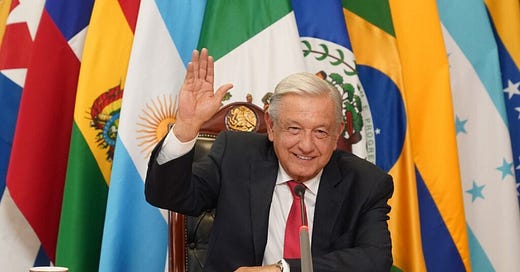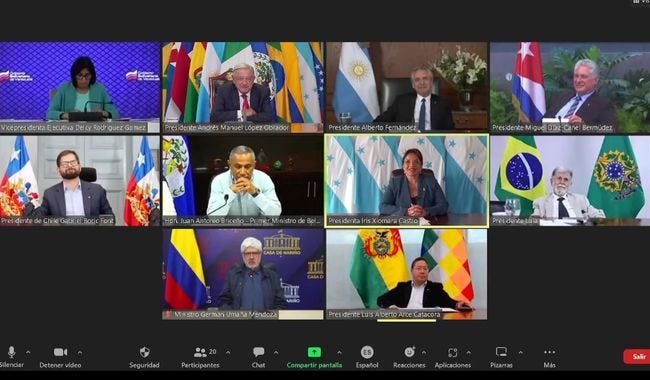"The fall of the dollar: What does it mean for Latin America?"
Strategies and proposals to tackle inflation and food insecurity.
The President of Mexico, Andres Manuel Lopez Obrador, has convened a meeting of eleven countries with the objective of collaborating and seeking solutions to issues such as inflation, food security, and cooperation between Latin American and Caribbean nations. The idea is to establish a treaty that will allow the participating nations to generate proposals, which will be evaluated and used to carry out multilateral collaboration to generate ideas and implement solutions that strengthen Latin American countries against the obstacles presented by the Ukraine War and the constant issuance of currency by the US Federal Reserve, which has generated the highest inflation in decades in response to the COVID-19 pandemic.
Argentina, led by President Alberto Fernandez, is focused on several important economic issues.
Firstly, they are working to address the issue of inflation and food security, as despite being a strong food producer, Argentina imports a large amount of food from countries such as Brazil and Chile. Commercial exchange of food and the search for common policies to facilitate this exchange has been proposed to address this.
Secondly, they are working on actions to reduce the weight of internal debt, which is a common problem in Latin American countries. In this sense, it is necessary to seek solutions in collaboration with international organizations such as the International Monetary Fund (IMF) and find ways to reduce dependence on external debt.
Finally, it is important to highlight that Argentina has a direct deal with China in yuan and pesos, which can be an opportunity to strengthen commercial and financial relations between the two countries.
Belize, represented by Prime Minister Juan Antonio Briceño, has stood out in the alliance of Latin American and Caribbean countries against inflation, proposing a strategy to diversify commercial partners and strengthen food security.
In this sense, Briceño has proposed an initiative of the alliance that includes 11 nations, which seeks to develop trade policies that promote investments in science and technology for agriculture and allow the diversification of commercial partners to reduce dependence on a single country or region.
In addition, there is a need to renew trade policies to strengthen food security, seeking to make food production and exchange more efficient and sustainable in the region. These measures aim to improve the living conditions of farmers and reduce the impact of inflation on the economies of Belize and other Latin American and Caribbean countries.
It is important to note that investment in science and technology for agriculture can be a key tool to address inflation and food security. Cooperation between countries on these issues is essential to achieve equitable and sustainable development in the region. Belize's proposal adds to the alliance's efforts to address these challenges jointly and seek long-term solutions.
The President of Bolivia, Luis Arce, has addressed the issue of inflation and the vulnerability of Latin American countries to globalization and interdependence between nations. In this sense, he has highlighted the importance of working together as nations to expand trade and tackle the economic and financial challenges affecting the region.
Arce has mentioned that production costs in Bolivia increase due to high fuel prices, which impacts inflation and the competitiveness of national products. Likewise, external debt and the high financial costs that Latin American countries must face are significant challenges.
To address these challenges, Bolivia seeks to demonstrate that it can work in unity with other countries in the region through the exchange of technologies and policies focused on the production of food and natural resources. In addition, strategies such as payment in national currency and the use of swaps, as Argentina has done with China, have been proposed to address the currency problem.
It is important to highlight that Bolivia has enough natural resources and internal food production, which can be an advantage in the fight against inflation and food insecurity. Cooperation between countries and the implementation of policies focused on the production and exchange of agricultural technologies can be key to jointly and sustainably addressing these challenges.
Chilean President Gabriel Boric has stated that inflation may have different causes in each country, although in Chile, price increases have occurred as a result of excessive injection of current capital into the economy. To address this situation, he has proposed decreasing tariffs with countries that do not have treaties, technological exchange in the agricultural sector, creating productive chains, and seeking private sector investments to open commercial networks.
Boric has advocated for fiscal responsibility, justice, and progressive distribution as pillars to address inflation. In this sense, he has indicated that anti-inflationary measures such as price containment in fuels, salary increases, and subsidies for basic necessities and medicines should be implemented. Additionally, he has suggested the need to adapt to price evolution to address inflation sustainably.
Chile is immediately prepared to decrease tariffs with countries that do not have treaties, which can be an essential measure to address inflation. The implementation of measures such as creating productive chains and technological exchange in the agricultural sector can be key to increasing the production and competitiveness of Chilean products. Seeking private sector investments to open commercial networks and implementing policies focused on fiscal responsibility, justice, and progressive distribution can contribute to addressing the economic and financial challenges affecting Chile and the region.
Miguel Diaz-Canel, Cuba's representative in the alliance of Latin American and Caribbean countries against inflation, proposes to facilitate and expand the exchange of goods by eliminating tariffs and using barter trade. He also suggests cooperation in food production and the exchange of products and services. Diaz-Canel emphasizes the importance of complementarity in the installed production capacity among countries. For example, Cuba could produce fertilizers if it reaches an agreement with another country that has phosphorus, nitrogen, and potassium, which would allow the production of fertilizers at more competitive prices than those imposed by the international situation. Regarding the technology transfer model, Cuba proposes to share its medical experience and provide general practitioners to fight chronic diseases. Finally, the Cuban representative suggests addressing connectivity in maritime and air transport, logistics, and storage to reduce freight prices.
The current situation in Honduras shows the need to take measures to combat inflation. Xiomara Castro Sarmiento has pointed out the direct relationship between inflation and war, in this case, between NATO, Ukraine, and Russia. The increase in the price of oil and its aftermath has increased energy costs, which, in turn, has affected accessibility to products and put the country's food and energy security at risk.
Therefore, it is necessary to demand a peace agreement between the parties involved in the conflict to reduce oil prices and decrease energy costs in Honduras. Additionally, an emergency credit opening for medium and long-term debts should be requested to cope with inflation and stabilize the country's economy. These measures are crucial to ensure the safety and well-being of the Honduran population.
Venezuela's Vice President, Delcy Rodriguez Gomez, has proposed the use of the energy of countries to produce food and provide reserves of oil and gas that are essential for food production. She has highlighted Venezuela's capacity to generate fertilizers and provide regional resources and has proposed an energy and petrochemical integration alliance to reduce extra-regional dependence.
A trading plan has also been developed to boost intraregional exports, and a powerful energy and petrochemical alliance is sought to increase each country's fertilizer and agricultural capacity. To achieve greater regional integration, the creation of a regional financial architecture with a new currency and a national currency payment scheme has been proposed.
The principle of complementarity, regional equity, and balance is sought for greater regional connectivity in blocks, similar to BRICS. It is important to note that there has been a joint rejection of economic blockades, and efforts are being made to end these forms of financial persecution that affect the region's development.
The proposal presented by Venezuela's Vice President aims at regional integration in energy, petrochemical, and trade terms, with the goal of strengthening agricultural production, reducing extra-regional dependence, and promoting financial stability. These measures may be essential to combat inflation and improve the region's food and energy security.
The Minister of Trade of Colombia, Germán Umaña, presented several proposals to address the challenges facing Latin America and the Caribbean. First, he reiterated the importance of promoting a peace agreement between Russia and Ukraine, which would bring stability and security to the region.
The minister also highlighted the need to develop a program against hunger through a common fund for the least favored sectors, as well as the importance of cooperating in the exchange of public policies and development to strengthen food security and ensure food sovereignty.
In addition, Minister Umaña proposed the need to create new payment systems, such as the Latin American Monetary Union, with the aim of contributing to redefining the architecture of the international financial system. He also mentioned the importance of working against protectionist propositions imposed by other nations.
The Green Pact was mentioned as an unclear initiative, but the importance of addressing climate change and the energy transition towards productive and sustainable development to address macroeconomic, health, educational, and fundamental rights difficulties in conjunction with the countries of the alliance was emphasized. In summary, Minister Umaña's proposals seek to address several challenges facing the region through cooperation, integration, and solidarity.
The Minister of Finance of Saint Vincent and the Grenadines, Camillo Gonsalves, has expressed his concern about inflation in the Latin American region due to economic stimuli in response to the COVID-19 pandemic. He highlights that in just one year, the stimuli surpassed the GDP of all Latin American countries and that the United States has provided the largest injection of federal funds in its history, which has had a particular impact on the inflation of imported food products from that country, such as animal proteins.
Gonsalves points to the need to establish air and maritime connectivity alliances between nations to facilitate the trade of key products in the basic baskets in the region. Additionally, his main objective is food security and the development of internal agriculture and fertilizer trade, to reduce the cost of food production.
The Minister also calls for peace agreements to end the conflicts that have affected the region. Finally, he highlights the need for a restructuring of the financial architecture to address current economic and social challenges. In summary, Saint Vincent and the Grenadines' vision focuses on food security, reducing production costs, and intra-regional trade, as well as promoting peace and proper financial restructuring.
In conclusion, the creation of a new financial system independent of the dollar has become an urgent necessity for Latin American countries. Dependence on the dollar has proven to be a burden for the region, as fluctuations in the value of this currency are having a significant negative impact on local economies and the ability of countries to develop autonomously. By creating a new independent financial system, Latin American countries will have the opportunity to develop a stronger and more resilient economy, which will enable them to effectively address economic and political crises. Additionally, this new financial system could drive agricultural, governmental, and social development, which would have a positive impact on the quality of life of citizens in the region. In summary, the creation of a new financial system independent of the dollar is crucial for the future of Latin American countries and should be considered a priority in the regional political agenda.
Like, Subscribe, and Share to Spread the Word!
Subscribed
If you found this analysis informative and eye-opening, we invite you to like, subscribe, and share this video to help us spread the word. Together, we can build a community of Financial Anarchy advocates who are dedicated to promoting financial literacy and advocating for sound monetary policies. By amplifying our message, we can empower individuals to take control of their financial well-being and contribute to a more equitable and sustainable future.
Support Our Work with a Bitcoin Donation
We also offer the opportunity to support our work and help us continue building the Financial Anarchy community. If you would like to make a contribution, we gratefully accept donations in Bitcoin. Your support will enable us to create more educational content, engage in meaningful activism, and further our mission of challenging the status quo. To donate, please use the following Bitcoin address:
1EkmtWDYzuhkiv3iYozKVnZFxsQxDetnfH
Thank you for joining us on this journey of understanding and change. Together, we can shape a brighter financial future for all.













